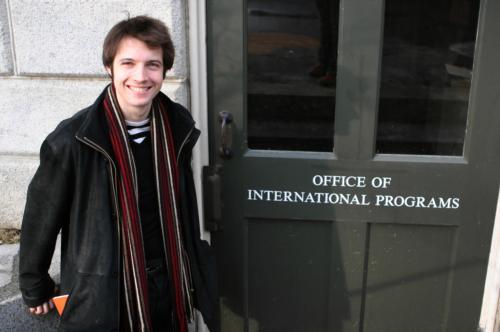
Freedom of Exchange
Meet Nathanael G. Mason. His clipped British accent may throw you for a loop. No, he’s not a redcoat who eschewed the Oxbridge system for a Harvard education. He’s actually French—from Annecy, a small town in the Alps near Geneva. And he’s one of the two students from L’Institut d’Études Politiques de Paris (dubbed Sciences Po) on campus this semester.
But Mason isn’t your average visiting student. He’s an exchange student. And the difference isn’t just in the semantics. It’s an entirely different program which doesn’t just strive for student enrollment, but rather seeks a long-term relationship with another university. These aren’t just weekend flings—it’s about trust, trust that helps to establish a network of universities for Harvard to deal with. And for the record: We’re mighty popular.
Discovering the Exchange Rate
“Exchange programs are typically an arrangement between two universities to exchange undergraduates,” associate director of the Office of International Programs (OIP) Leslie M. Hill says.
“The exchanges have been set up for inter-institutional relations,” explains Cathy H. Winnie, director of the OIP. “But the more you have an exchange of bodies going both ways, the more you have a fabric, a network of relations.” Although this can happen with other kinds of study abroad programs, Winnie explains that close ties aren’t always easy to come by. “Especially if you go with another group of schools,” she adds.
Harvard’s current exchanges include the Killam Fellowships Academic Exchange Program in Canada, the Uppsala University-Harvard College Exchange Program in Sweden and L’Institut d’Études Politiques de Paris in France.
“What’s important to us is a good match,” Hill says. And academics, of course, are at the forefront of the selection process when Harvard begins talks for new exchange programs.
“We’re about to sign an agreement with the university of Boconni,” Hill says. The Università Commerciale Luigi Bocconi, Harvard’s latest exchange, boasts one of the best economics programs in the world, according to Hill.
In addition to these programs, the David Rockefeller Center for Latin American Studies is working in conjunction with the OIP to oversee exchanges in the Americas. The Rockefeller Center’s exchange with Brazil expired in 2005. “Next year, we will be engaging with a program in Canada and Mexico,” says Erin E. Goodman, program officer at the Rockefeller Center.
As a result of a grant from the Fund for the Improvement of Postsecondary Education (FIPSE), a program created by the U.S. Department of Education, Harvard students will be able to pursue cultural and academic studies in Canada and Mexico through what Hill aptly described as “Friendship Grants”—something the FIPSE founders thought could promote friendly relations.
Let’s Get Friendly
Right now, there are only three official exchange students on Harvard’s campus: two from Sciences Po and one from Canada. Both Mason and his fellow compatriot Chine Labbé are students at Sciences Po, whose curriculum centers on the social sciences. Harvard’s direct exchange with Sciences Po is aimed at concentrators in sociology, government, economics, history and social studies. Take note—the application for admission to Sciences Po is due May 31, but you must apply for Harvard credit at the OIP by March 15.
Mason, like other fellow third year students at Sciences Po, must spend this year abroad. “Its part of our degree, our curriculum,” Mason explains. According to him, Sciences Po has several programs stateside. “Harvard was my first choice.”
So what exactly drew Mason to Cambridge?
“The prestige in Europe,” Mason explains, but the lure of exploring the historic east coast was also attractive.
Boston winters aside, Mason says adjusting to life at Harvard wasn’t too difficult. Life on the campus is readily easy, Mason explains. “There’s a house, there’s tutors. It’s kind of a nanny university.”
Sciences Po doesn’t have on-campus housing, Mason adds. He had to deal with living expenses like rent and grocery shopping—troubles few Harvard undergrads choose to tackle. “I feel a bit babied,” Mason says, who is now a resident of Kirkland House. But the House system has its perks. “I think it’s a good system. I like the idea of the social life in houses. I think it’s a strong point for the American system.”
Life Swapping
Residential life isn’t the only novel thing about American college life for the exchange students. Like many freshmen during orientation week, Mason was blown away by the extent of extracurricular activities at Harvard. While students at Sciences Po spend more time in the classroom, Harvard kids are running clubs and founding organizations. “They don’t expect you to get involved in organizations as much,” Mason says of Sciences Po. But on U.S. soil, this Frenchman has decided to get involved in some extracurriculars. “I go to the forum in the Kennedy school quite often, the IOP,” he says.
Mason, in his effort to experience true American culture, has joined in a variety of U.S. trends. “Well, I’ve gotten to see a few series on TV: ‘Desperate Housewives,’ ‘Friends,’ ‘The West Wing.’ ‘Desperate Housewives’ is having this huge success in France now...I think it’s an interesting way to get to know the culture,” he says of Susan, Bree, and Gaby.
But here is where the exchange program really kicks in: Mason acted as an application consultant for the two Harvard students studying at Sciences Po this semester. “I helped them to prepare for their application and I’m sure they’re having a great time,” he says. Mason also served as a social adviser, explaining how the life at Sciences Po would be different or intimidating. This kind of reciprocal interaction is just what Harvard likes to see. Hopefully, more than just a lasting love for “Desperate Housewives” will be exchanged between the two schools.


